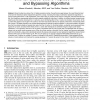Free Online Productivity Tools
i2Speak
i2Symbol
i2OCR
iTex2Img
iWeb2Print
iWeb2Shot
i2Type
iPdf2Split
iPdf2Merge
i2Bopomofo
i2Arabic
i2Style
i2Image
i2PDF
iLatex2Rtf
Sci2ools
129
click to vote
TC
2008
2008
Counter-Based Cache Replacement and Bypassing Algorithms
Recent studies have shown that, in highly associative caches, the performance gap between the Least Recently Used (LRU) and the theoretical optimal replacement algorithms is large, motivating the design of alternative replacement algorithms to improve cache performance. In LRU replacement, a line, after its last use, remains in the cache for a long time until it becomes the LRU line. Such dead lines unnecessarily reduce the cache capacity available for other lines. In addition, in multilevel caches, temporal reuse patterns are often inverted, showing in the L1 cache but, due to the filtering effect of the L1 cache, not showing in the L2 cache. At the L2, these lines appear to be brought in the cache but are never reaccessed until they are replaced. These lines unnecessarily pollute the L2 cache. This paper proposes a new counter-based approach to deal with the above problems. For the former problem, we predict lines that have become dead and replace them early from the L2 cache. For th...
Cache | Information Technology | L1 Cache | L2 Cache | TC 2008 |
| Added | 15 Dec 2010 |
| Updated | 15 Dec 2010 |
| Type | Journal |
| Year | 2008 |
| Where | TC |
| Authors | Mazen Kharbutli, Yan Solihin |
Comments (0)

